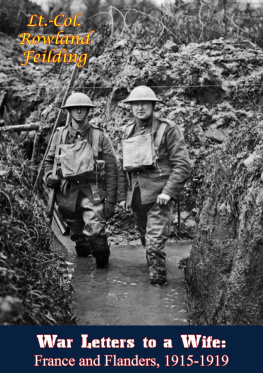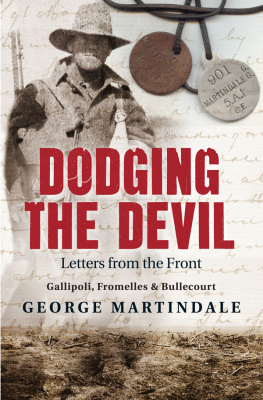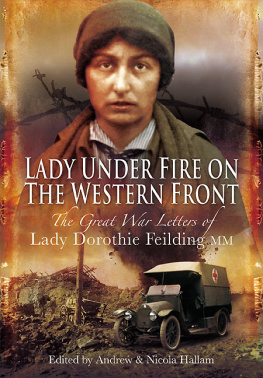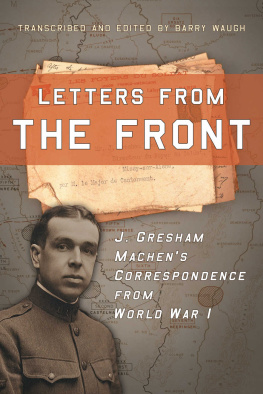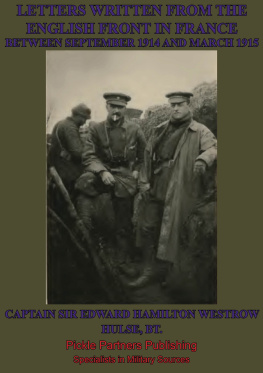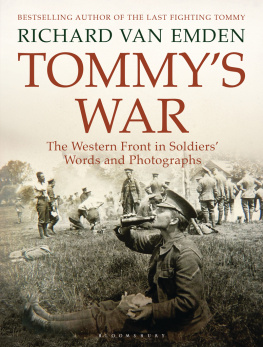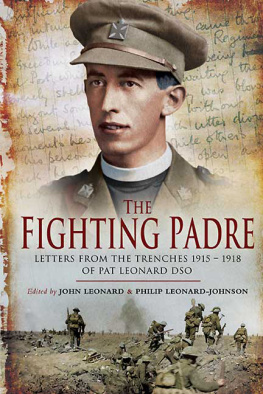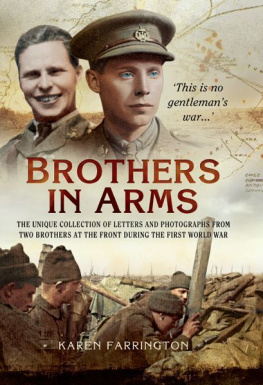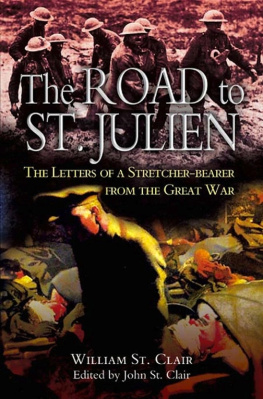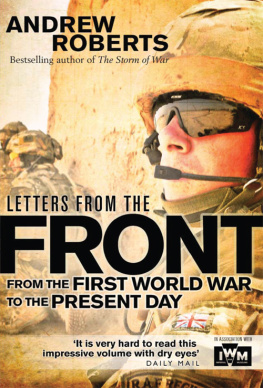

This edition is published by PICKLE PARTNERS PUBLISHINGwww.pp-publishing.com
To join our mailing list for new titles or for issues with our bookspicklepublishing@gmail.com
Or on Facebook
Text originally published in 1929 under the same title.
Pickle Partners Publishing 2016, all rights reserved. No part of this publication may be reproduced, stored in a retrieval system or transmitted by any means, electrical, mechanical or otherwise without the written permission of the copyright holder.
Publishers Note
Although in most cases we have retained the Authors original spelling and grammar to authentically reproduce the work of the Author and the original intent of such material, some additional notes and clarifications have been added for the modern readers benefit.
We have also made every effort to include all maps and illustrations of the original edition the limitations of formatting do not allow of including larger maps, we will upload as many of these maps as possible.
WAR LETTERS TO A WIFE:
FRANCE AND FLANDERS, 1915-1919
BY
ROWLAND FEILDING

TABLE OF CONTENTS
Contents
DEDICATION
TO MY WIFE
PREFACE
IT is well to explainin case the criticism may be made that the letters which follow show a defiance of the censorshipthat the originals contained no place names or other indiscretions. These have been added from the writers diary.
The letters were written while the events described were fresh in mindoften actually on the battlefield or in the trenches. That is their claim to interest, coupled with the extraordinary luck which permitted an individual to survive so long in the front line. Such an experience was allowed by Fate to very few.
LIST OF ILLUSTRATIONS
FRONTISPIECE
AFTER THE BATTLE OF LOOSThe Colliery Headgear (known by the Soldiers as the Tower Bridge)
BRITISH ATTACK ON HOHENZOLLERN REDOUBT13 th October, 1915Clouds of smoke and gas can be seen in the distance, and the British Trenches can be traced by the chalk which has been excavated
HIGH STREET, GUILLEMONTSeptember, 1916
BATTLE OF GINCHY, 9 TH SEPTEMBER, 1916Supporting Troops moving up to the Attack
THE CLOTH HALL, YPRES
WATERLOGGED SHELL-HOLES ON THE BATTLEFIELD
AERIAL VIEW OF YPRES
RUINED VILLAGE OF WYTSCHAETE8 th June, 1917
DELVILLE WOOD
THE VILLAGE OF GINCHY
A MUDDY COMMUNICATION TRENCH
A TANK IN ACTION
A CREEPING BARRAGE
DISABLED TANKS ON THE BATTLEFIELD
A SHELL-PITTED BATTLEFIELD IN FRANCE
All the above photographs are copyright by the Imperial War Museum, by whose permission they are reproduced.
INTRODUCTION
BY
MAJOR-GENERAL SIR JOHN PONSONBY, K.C.B., C.M.G., D.S.O.
THIS book contains letters written by a soldier to his wife during practically the whole period of the European War.
They are written by Colonel Rowland Feilding, and give us a very vivid picture of the life of a regimental officer on active service. No family has been more closely identified with the Coldstream Guards than the Feildings, and it was only natural that Rowland Feilding should have been posted to the regiment where so many of his family have served with great distinction. He was appointed Captain in the 3 rd Battalion Coldstream Guards in 1915, and was subsequently transferred to the 1 st Battalion, which I had the honour to command.
Rowland Feilding soon proved himself to be a keen and capable officer, and I can add from personal observation, an officer in whom all ranks had the greatest confidence.
Perhaps, as Colonel Guy Baring expressed it, he was too brave; but the real truth was that Rowland Feilding could not bear giving orders to a subordinate officer to carry out any dangerous duty, and always applied to carry out the duty in question himself. How he managed to survive the War will always remain a mystery to me and many others.
Eventually Rowland Feilding was strongly recommended for the command of a battalion of the New Army, and it was decided by Army Headquarters that an officer of his age, ability and experience, would be a great asset to a newly formed battalion. He was therefore in 1916 given command of the 6 th Battalion Connaught Rangers.
This regiment and, later, the 1 st Civil Service Rifles he led with conspicuous success till the conclusion of the War.
It is given to very few to be able to write letters so full of interest, so free from criticism of his senior officers, so free from exaggeration, and so modest and unassuming.
These letters will be read with great interest by Rowland Feildings brother officers, who will always remember how Snowball, by which name he was affectionately known by all ranks, carried on the high traditions of his regiment and family.
JOHN PONSONBY
FOREWORD
IN the end of ends, infantry is the deciding factor in every battle (it) bears the heaviest burden of a battle and requires the greatest sacrifice.
They have to endure the heaviest bombardments of the enemy, lying quietly in dirt and mud, in damp and cold, hungry and thirsty, or huddled in dug-outs, holes, and cellars, they must await the overpowering assault, until, leaving the safety of their shelters, face to face with death, they must rise to meet the destroying storm. Such is their life. It can be endured only when discipline has prepared the way, and when a deep love of the Fatherland and an imperative sense of duty fill the heart.
Those who have stayed at home cannot picture it to themselves too often. Before such heroism they must bow the head in silenceand not talk.
Ludendorff.
We owe these victories to the perfect co-operation of all arms, and, most, perhaps, of all, to the immortal valour of our noble infantry, which continues to bear the greatest burden in the fight, and has once more won imperishable renown. Without it all the labours of other arms would be in vain. It is the infantry with rifle, bomb, and bayonet that both takes and holds, endures the greatest and the longest strain, and suffers by far the heaviest losses. Few lookers-on witness its deeds of valour, but, if we were just, we should distinguish its incomparable gallantry by granting it in future the precedence over all other arms, which it has fairly won by its devotion and its sacrifices.
The Times Military Correspondent, June 25, 1917.
The poor binfantry.
British Soldier.
WAR LETTERS TO A WIFE
April 29, 1915.
Harfleur.
We left Windsor the day before yesterdaya draft of 12 officers and 250 men. The regimental band led the way to the station at the foot of the hill, playing lively airs, as is the custom when troops are leaving for the front. A crowd followed, and men and women pressed forward to shake hands with their friends among the men. The latter seemed very cheerful and sang lustily as they marched along.
We left Southampton for Havre at 9 p.m. and berthed at 6.30 yesterday morning. Leaving the docks at 8.10 we marched about 5 miles to the Reinforcement Camp, where we now are. It was very hot, and after a rough crossing, I think most of the draft found the march rather trying, being, as they were, in heavy marching order. As for myself, it was the first time I had ever carried a pack, and it felt as if it was filled with lead before we reached Harfleur. I am glad to learn that, as a Captain, it is not likely that I shall have to carry one again.
Next page
